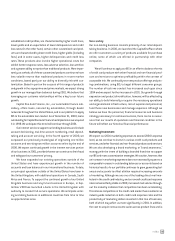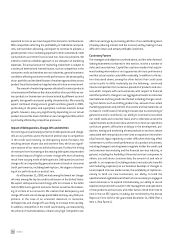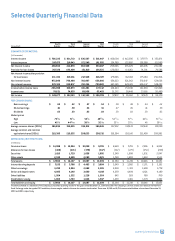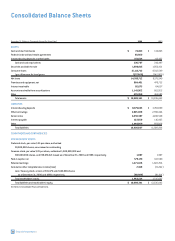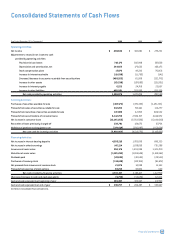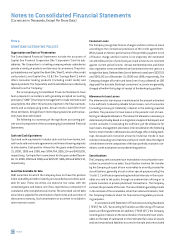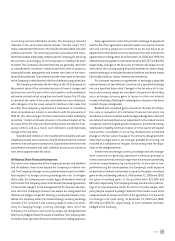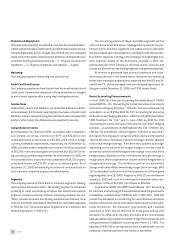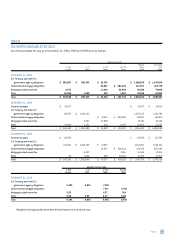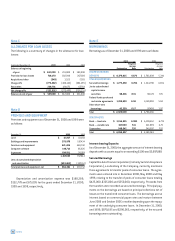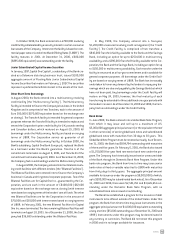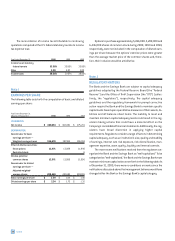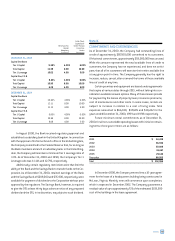Capital One 2000 Annual Report Download - page 51
Download and view the complete annual report
Please find page 51 of the 2000 Capital One annual report below. You can navigate through the pages in the report by either clicking on the pages listed below, or by using the keyword search tool below to find specific information within the annual report.
notes 49
in servicing and securitizations income. The Company’s retained
interests in the securitized assets include "interest only"("I/O")
strips, subordinated interests in the transferred receivables and cash
collateral accounts. The servicing revenues associated with trans-
ferred receivables adequately compensate the Company for servicing
the accounts. Accordingly, no servicing asset or liability has been
recorded. The Company’s retained interests are generally restricted
or subordinated to investors’ interests and their value is subject to
substantial credit, prepayment and interest rate risks on the trans-
ferred financial assets. The investors and the trusts have no recourse
to the Company’s other assets for failure of debtors to pay when due.
The Company estimates the fair value of the I/O strip based on
the present value of the estimated excess of finance charges and
past-due fees over the sum of the return paid to certificateholders,
estimated contractual servicing fees and credit losses. The I/O strip
is carried at fair value in accounts receivable from securitizations,
with changes in the fair value, except for declines in fair value that
are other than temporary, reported as a component of cumulative
other comprehensive income in accordance with the provisions of
SFAS No. 115, "Accounting for Certain Investments in Debt and Equity
Securities." Certain estimates inherent in the determination of the
fair value of the I/O strip are influenced by factors outside the Com-
pany’s control, and as a result, such estimates could materially
change in the near term.
Subordinated interests in the transferred receivables and cash
collateral accounts serve as forms of credit enhancement for investor
interests in securitization transactions. Subordinated interests in the
transferred receivables and cash collateral accounts are carried at
cost, which approximates fair value.
Off-Balance Sheet Financial Instruments
The nature and composition of the Company’s assets and liabilities
and off-balance sheet items expose the Company to interest rate
risk. The Company’s foreign currency denominated assets and liabil-
ities expose it to foreign currency exchange rate risk. To mitigate
these risks, the Company uses certain types of derivative financial
instruments. The Company enters into interest rate swap agreements
("interest rate swaps") in the management of its interest rate expo-
sure. All of the Company’s interest rate swaps are designated and
effective as hedges of specific existing or anticipated assets or lia-
bilities. The Company enters into forward foreign currency exchange
contracts ("f/x contracts") and currency swaps to reduce its sensi-
tivity to changing foreign currency exchange rates. All of the
Company’s f/x contracts and currency swaps are designated and
effective as hedges of specific assets or liabilities. The Company does
not hold or issue derivative financial instruments for trading purposes.
Swap agreements involve the periodic exchange of payments
over the life of the agreements. Amounts paid or received on interest
rate and currency swaps are recorded on an accrual basis as an
adjustment to the related income or expense of the item to which the
agreements are designated. As of December 31, 2000 and 1999, the
related amounts payable to counterparties were $26,727 and $4,748,
respectively. Changes in the fair value of interest rate swaps are not
reflected in the accompanying financial statements, where desig-
nated to existing or anticipated assets or liabilities and where swaps
effectively modify or reduce interest rate sensitivity.
F/x contracts represent an agreement to exchange a specified
notional amount of two different currencies at a specified exchange
rate on a specified future date. Changes in the fair value of f/x con-
tracts and currency swaps are recorded in the period in which they
occur as foreign currency gains or losses in other non-interest
income, effectively offsetting the related gains or losses on the items
to which they are designated.
Realized and unrealized gains or losses at the time of termina-
tion, sale or repayment of a derivative financial instrument are
recorded in a manner consistent with its original designation. Amounts
are deferred and amortized as an adjustment to the related income
or expense over the original period of exposure, provided the desig-
nated asset or liability continues to exist, or in the case of anticipated
transactions, is probable of occurring. Realized and unrealized
changes in the fair value of swaps or f/x contracts, designated with
items that no longer exist or are no longer probable of occurring, are
recorded as a component of the gain or loss arising from the dispo-
sition of the designated item.
Interest rate and foreign currency exchange rate risk manage-
ment contracts are generally expressed in notional principal or
contract amounts that are much larger than the amounts potentially
at risk for nonperformance by counterparties. In the event of non-
performance by the counterparties, the Company’s credit exposure
on derivative financial instruments is equal to the gross unrealized
gains on the outstanding contracts. At December 31, 2000 and 1999,
the gross unrealized gains in the portfolio were $23,890 and
$83,314, respectively. The Company actively monitors the credit rat-
ings of its counterparties. Under the terms of certain swaps, each
party may be required to pledge collateral if the market value of the
swaps exceeds an amount set forth in the agreement or in the event
of a change in its credit rating. At December 31, 2000 and 1999,
$55,364 and $58,717, respectively, of such collateral had been
pledged to the Company.


